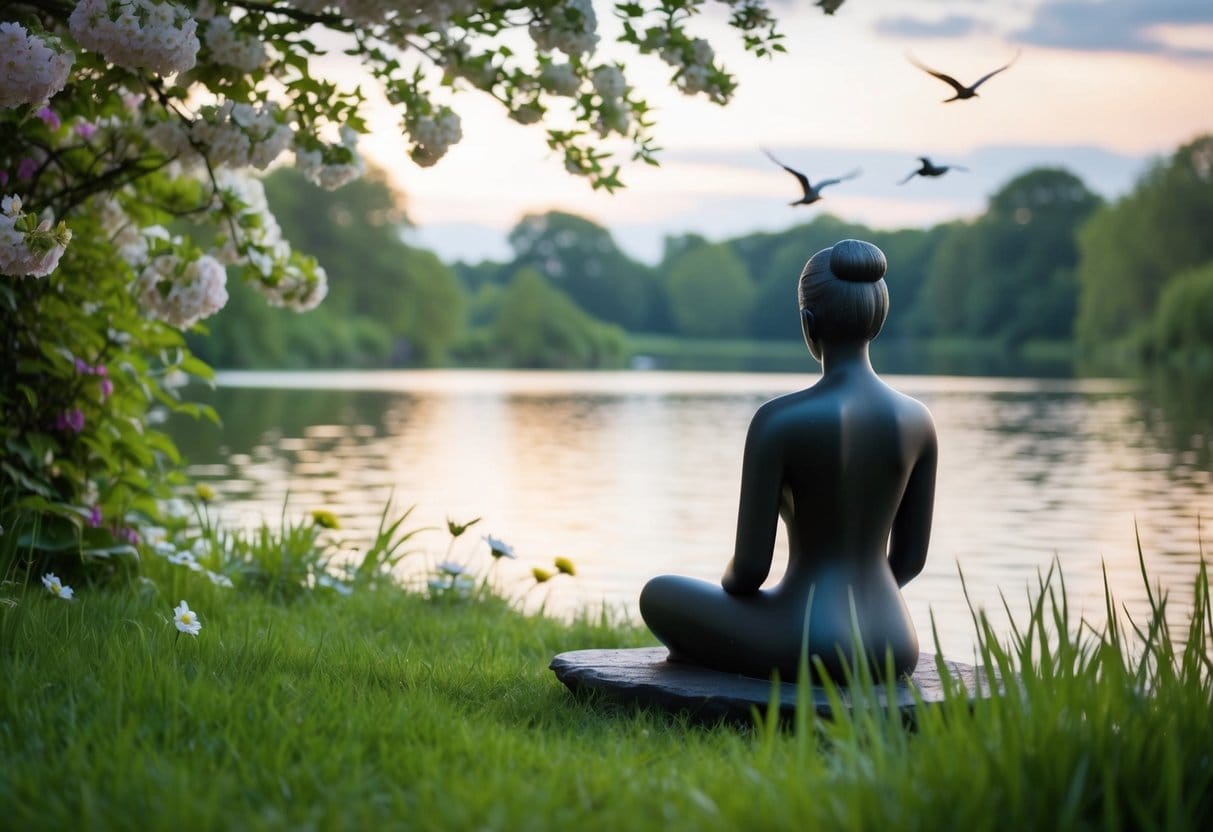Table of Contents
Discovering the joy of solitude can be a transformative experience that opens new pathways to peace and creativity.
In a world that often demands constant interaction and engagement, alone time emerges as an essential opportunity for personal growth.
When you embrace your own company, the distractions of daily life fade away, allowing your mind to wander and your imagination to flourish.

One of the most valuable aspects of solitude is the unique sense of peace it provides, nurturing both mental health and overall wellbeing.
This quiet sanctuary allows you to reflect, recharge, and gain clarity in your thoughts and emotions. Whether you are rekindling relationships with yourself or nurturing your mental state, solitude becomes a powerful ally in rediscovering the balance and joy in your life.
Amidst the tranquility, the creativity you find could lead to new insights and ideas, enriching your personal and professional life.
Engaging with nature during these moments amplifies the sense of serenity, offering a deeper connection to the world and to yourself. By savoring the quietude, you unlock not only inner peace but also a wellspring of creative potential waiting to be tapped.
Key Takeaways
- Solitude fosters peace and enhances mental wellbeing.
- Alone time is instrumental in fostering personal and professional growth.
- Nature enriches the solitude experience, deepening your connection to self.
The Essence of Solitude

The experience of solitude offers a unique opportunity to embrace self-discovery and inner peace. It allows you to explore both what solitude truly means and how to appreciate alone time.
Understanding Solitude vs. Loneliness
Solitude and loneliness are often misunderstood to be the same, yet they differ significantly.
Solitude is a chosen state where you find peace and clarity in your thoughts. It offers a time to recharge and foster creativity without external distractions. In contrast, loneliness is a feeling of isolation and disconnection, which can occur even in a crowd.
It’s important to acknowledge these differences to fully enjoy and benefit from your solitary time. When you deliberately choose solitude, it becomes a nourishing experience.
Recognizing solitude as an opportunity for growth can help you use alone time to explore your passions, thoughts, and desires more deeply.
Embracing Alone Time
Embracing alone time starts by recognizing it as an essential aspect of personal well-being.
Spending time alone allows for self-reflection and cultivates mental clarity. This can lead to increased creativity and problem-solving abilities.
Use this time to pursue hobbies, meditate, or simply enjoy the peace that comes from being with yourself.
Alone time provides a space free from judgment or pressure, allowing you to explore who you truly are and what genuinely brings you joy.
Engaging in activities that resonate with your interests during these moments can lead to profound insights and a deeper understanding of your own needs and desires.
Mental and Emotional Benefits

Spending time alone offers various mental and emotional advantages, encouraging a deeper connection with oneself. It enhances creativity and productivity, fosters self-reflection and introspection, and boosts emotional well-being and self-esteem.
Boosting Creativity and Productivity
Solitude provides a unique opportunity to boost creativity and productivity.
Free from distractions and external pressures, you have the space to think deeply and explore innovative ideas. This alone time allows your mind to wander, which can lead to unexpected solutions and new perspectives.
When you have uninterrupted time, focus improves, enabling you to work more efficiently. Your brain can process information more clearly, leading to better decision-making and problem-solving.
Many creative individuals find that solitude is essential for generating original ideas and producing high-quality work.
Fostering Self-Reflection and Introspection
Self-reflection and introspection are key components of personal growth.
In solitude, you can examine your thoughts and emotions without external influences. This quiet time allows you to gain insight into your behavior, motivations, and life goals, offering a clearer perspective on what truly matters to you.
By engaging in introspection, you can identify areas in your life that may need improvement. This process helps in setting personal goals and recognizing ways to make positive changes.
Time spent alone can also lead to a better understanding of your values and beliefs, fostering a stronger sense of self.
Enhancing Emotional Well-Being and Self-Esteem
Solitude can significantly enhance emotional well-being and self-esteem.
Time spent alone allows you to recharge and reduce stress, which is beneficial for mental health. It provides the opportunity to process emotions and experiences in a calm environment, promoting emotional balance and resilience.
By spending time with yourself, you can learn to appreciate your own company, leading to higher self-esteem. This self-awareness builds confidence, as you become more comfortable with who you are.
With greater emotional insight, you can develop healthier relationships and a more positive outlook on life.
The Role of Nature in Solitude

Spending time alone in nature can profoundly enhance your solitude experience. Natural surroundings foster tranquility and serve as a powerful catalyst for achieving inner peace.
Finding Tranquility in Natural Settings
Being immersed in nature often provides a respite from daily stressors. The natural world, with its serene landscapes, offers an environment where you can ease your mind.
Nature’s calming effects can help reduce stress and anxiety. Listening to the rustle of leaves or the gentle flow of water encourages relaxation and reflection.
As you disconnect from the hustle and bustle of modern life, you gain the opportunity to refresh your mental state in these peaceful settings.
Consider simple activities like walking through a forest or sitting by a quiet stream. These actions can help you appreciate the world around you and bring clarity to your thoughts by providing physical and mental space.
Nature as a Catalyst for Inner Peace
Engaging with nature allows you to explore your inner thoughts and emotions more openly. The absence of urban distractions gives you a chance to reconnect with yourself and find inner peace.
Mindfulness practices often encourage interaction with the natural environment. These practices can help ground your emotions and enhance self-awareness.
When you absorb the sights, sounds, and smells of the outdoors, you become more attuned to your inner self.
Nature can amplify the solitude time you spend reflecting on personal growth and creativity. Use this connection to gain insights into challenges and discover solutions by allowing the serene surroundings to guide your thoughts gently.
Physical and Spiritual Recovery

Time spent alone can be transformative for both your physical and spiritual well-being. Solitude allows you to recharge physically, and quiet moments facilitate deeper healing through methods such as meditation.
Solitude for Relaxation and Recharge
In a world of constant stimulation, solitude becomes essential for relaxation and recharging.
Alone time grants you the opportunity to disconnect from external demands and focus on self-care. Simple activities like taking a walk or enjoying a quiet read help calm the mind and reduce stress.
These moments allow you to physically rest, lowering stress-related hormones and improving overall health.
Engage in naps or light exercises like stretching when alone. These actions recharge your energy levels, preparing you for upcoming challenges.
Regularly scheduling quiet periods can enhance your body’s ability to recover from daily stresses and physical exertion.
Healing Through Quiet Time and Meditation
Quiet time and meditation play a vital role in spiritual healing.
By setting aside periods for introspection and mindfulness, you can develop a deeper sense of self-awareness.
Meditation, in particular, helps focus the mind and encourages emotional clarity.
Establish a consistent meditation routine to facilitate healing, bringing about a sense of peace and mental clarity.
Engaging in quiet time offers a space to cultivate a forgiving and kind attitude towards yourself.
By embracing these practices, you create a mental landscape for healing, allowing you to develop self-compassion and emotional resilience.
These techniques contribute to both spiritual and emotional growth, providing a well-rounded approach to recovery.
Cultivating Relationships and Personal Growth

Balancing social interaction with alone time is crucial for personal growth. It allows you to gain self-awareness while maintaining meaningful relationships. Self-care practices enhance your well-being, contributing to healthier interactions with others.
Balancing Social Interaction and Alone Time
Achieving harmony between social interaction and solitude is vital.
Spending time alone helps you reflect on your thoughts, fostering self-discovery. This introspection enhances personal growth by clarifying your goals and priorities.
Social connections are equally important. Interacting with others bolsters emotional support and shared experiences.
Designate specific times for social activities and solitude to maintain balance. Make a conscious effort to engage in activities with friends or family, but also prioritize moments for yourself.
Self-Care for Healthier Relationships
Self-care is essential in nurturing relationships.
Alone time is a valuable opportunity for self-reflection and rejuvenation. Activities like meditation or journaling can enhance emotional resilience, which positively impact your interactions with others.
By taking care of your mental and physical well-being, you become a more present and supportive partner or friend.
Establish regular self-care routines, such as setting boundaries, exercising, or engaging in creative pursuits to improve your emotional state, enhancing your capacity to connect with others deeply.
The Joy of Solitude: Mindfulness and Self-Discovery
Embracing solitude fosters an environment where mindfulness and self-discovery can thrive. Through intentional practices and personal reflection, you can unlock inner peace and deepen your self-awareness.
The Art of Mindfulness in Solitude
Mindfulness in solitude involves being fully present in your alone time, enhancing your awareness of thoughts and feelings.
Journaling is a powerful tool that helps in this process. By writing down your thoughts, you can identify patterns in your thinking and uncover deeper insights.
Practicing mindfulness can lead to a sense of inner peace. Simple activities like meditative walks or focused breathing exercises help you stay centered.
These practices allow you to acknowledge your thoughts without judgment, increasing emotional resilience.
Journey to Self-Discovery and Personal Insights
Solitude encourages self-reflection, giving you the opportunity to explore your values, beliefs, and motivations.
Reflective practices such as journaling and meditation provide a structured way to examine your experiences and goals.
By spending time alone, you can gain personal insights that fuel self-discovery. Understanding your authentic self empowers you to make decisions aligned with your true desires.
This journey often reveals hidden strengths, increasing your confidence and independence.
Approaching self-discovery with an open mind allows for genuine introspection, leading to meaningful personal growth.
Frequently Asked Questions
How can solitude contribute to personal growth and creativity?
When you spend time alone, you have the opportunity to deeply reflect on your thoughts and feelings. This environment enables you to engage in self-discovery, identify personal goals, and unlock creative potential. Without external noise, your imagination can flourish.
In what ways does embracing alone time positively impact mental health?
Embracing alone time provides a much-needed break from social pressures and allows you to recharge. This can lead to reduced stress, improved emotional regulation, and increased resilience.
Solitude can also help you develop a greater understanding of your emotions, contributing to better overall mental health.
What are the psychological benefits of regularly practicing solitude?
Regular practice of solitude can lead to heightened self-awareness and improved concentration. You might find increased clarity in decision-making and a stronger sense of identity.
This practice also encourages mindfulness, helping you appreciate the present moment.
How might one cultivate a fulfilling practice of solitude?
To cultivate solitude, establish a routine that includes dedicated alone time. Choose activities that genuinely interest you, such as reading, journaling, or walking in nature.
Consistency is key to developing a practice that feels rewarding and fulfilling.
What strategies can help individuals find joy in their alone time?
Finding joy in solitude requires letting go of distractions and embracing hobbies or interests that bring personal satisfaction. Explore new activities, set personal goals, and focus on gratitude.
By doing so, you create a positive and enriching experience during your alone time.
How does solitude enhance one’s ability to form deeper connections with others?
Solitude provides the space to understand your own needs and boundaries. When you are clear about your emotions and priorities, you can engage more authentically with others.
This clarity fosters deeper and more meaningful connections, as you bring a more self-aware self into your relationships.
Want to unlock inner peace and creative potential through alone time?
These resources can help:
- “Solitude: A Return to the Self” by Anthony Storr: Explores the positive aspects of solitude and its role in creativity and personal development.
- “Quiet: The Power of Introverts in a World That Can’t Stop Talking” by Susan Cain: While about introversion, it heavily emphasizes the need for solitude for introverts to thrive and be creative.
- “Walden; or, Life in the Woods” by Henry David Thoreau: A classic meditation on living simply and finding meaning in nature and solitude.
- “The Artist’s Way” by Julia Cameron: Advocates for “Artist Dates” (solo time for creative exploration) and “Morning Pages” (a solo reflective practice).
- “Deep Work: Rules for Focused Success in a Distracted World” by Cal Newport: While about productivity, it strongly advocates for periods of uninterrupted, solitary focus for deep creative work.




